In the wake of the assassination of Pakistan People's Party leader Benazir Bhutto, stability seems to be the key goal among top rivals in secular political leadership. The PPP has announced that in keeping with Ms. Bhutto's wishes, her son Bilawal Bhutto Zardari, a 19-year-old student at Christ Church College, Oxford, will take the helm of the party, with her husband, Bilawal's father, managing day-to-day affairs until Bilawal finishes his studies.
The Bhutto family has run the PPP since its founding, by Benazir's father, and the move appears to be an attempt to assure supporters that the movement will have continuity of personality and of vision. Asif Ali Zardari, Bilawal's father, has called for the United Nations to launch a special investigatory commission to uncover the plotters behind the assassination, as several opposition leaders and foreign officials say the Musharraf government lacks the credibility to carry out the probe.
The risk of severe destabilization across Pakistan has been evidenced by ongoing violence, bloodshed and arson, in what many have called a collective "outpouring of grief and anger" on the part of Bhutto supporters and those who blame rival factions for the plot. Pres. Musharraf has said he will not tolerate further violence, but a crackdown has not come, and he has reportedly told UK PM Gordon Brown he will consider international help in probing the killing.
Aides close to Bhutto and to opposition rival, fmr. PM Nawaz Sharif, have said they believe the plot may have originated inside the government itself, and for this reason, the government should not be permitted to lead the investigation. In response to calls from the PPP leadership to drop its boycott of the scheduled January elections, Sharif's party has reversed its position and said it will participate in the campaign, which many are still saying should be postponed to ensure a "free and fair" election.
Sunday, December 30, 2007
Friday, December 28, 2007
Bhutto Assassination Signals Deep-running Political Rift that Could Destabilize Pakistan
Fmr. Pakistan prime minister Benazir Bhutto, whose father was executed in the process of a military coup in the 1970s, and who has said she remained "broken" by what had happened to her during 5 years in military prison, was assassinated Thursday, while campaigning to restore free elections to her country. She had been the first woman elected PM in a Muslim country and had sworn she would combat radical fundamentalism and end the cycle of military takeovers.
Since her return to Pakistan in October, she has faced an attempt on her life that killed over 100 supporters, multiple incidents of house arrest, the suspension of the Constitution, martial law and the arbitrary replacement of several supreme court justices by then military leader Gen. Pervez Musharraf. While Pres. Musharraf himself claimed he had surrounded her home with more than 4,000 police and concrete barricades "for her own safety", Bhutto had accused several high-ranking members of Musharraf's security apparatus of ties to fundamentalist militia in the Northwest of the country.
Bhutto has said repeatedly that she returned to Pakistan knowing it would put her life at risk, but that she could not live comfortably in exile while she watched a major threat to her nation gather force and potentially destroy hopes for the restoration of democracy and the rule of law. She was considered the favorite to win the premiership in January elections, slated to be held after much wrangling, international pressure, Musharraf's resigning as military chief and the subsequent lifting of martial law.
Now, the entire global community must face the harsh reality that Benazir Bhutto's assassination poses a very serious threat to regional stability, and could plunge Pakistan into a confused multi-faceted power-struggle in which democracy is likely to lose out to authoritarian measures, which will be justified as an attempt to secuure Pakistan's nuclear weapons against radical Islamist militia groups.
In the US, condemnation of the assassination is near universal, and political and security analysts are warning of the dangers that could emerge either from "ignoring the threat" posed by radical groups that may have been responsible and by the Musharraf government's duplicity in both countering and collaborating with these insurgent elements, or by taking too aggressive a stance against any element internal to Pakistan's domestic political struggles.
Concern is widespread among governments that have backed Gen. Musharraf's regime that his transition to democracy has been slow and clumsy, or even halting and contrary, while his dealmaking with radical militia groups has contributed to their taking root and being emboldened across the poorly policed northwest border region.
In responsible political and diplomatic circles, pressure will be heavy on Pres. Musharraf to find and to subject to serious, open criminal prosecution those responsible, even should they be members of his top-level security establishment, as some Bhutto supporters allege.
That group is often viewed with suspicion both by democrats and by those radical insurgents most opposed to an open democratic state in Pakistan, and demonstrating the will to counter such elements could give the government the credibility it needs to work with opposition leaders and to effectively stabilize the remote border regions. Though at present, many fear the Musharraf government is too heavily reliant on the strong-arm support of rogue elements in the security establishment.
Since her return to Pakistan in October, she has faced an attempt on her life that killed over 100 supporters, multiple incidents of house arrest, the suspension of the Constitution, martial law and the arbitrary replacement of several supreme court justices by then military leader Gen. Pervez Musharraf. While Pres. Musharraf himself claimed he had surrounded her home with more than 4,000 police and concrete barricades "for her own safety", Bhutto had accused several high-ranking members of Musharraf's security apparatus of ties to fundamentalist militia in the Northwest of the country.
Bhutto has said repeatedly that she returned to Pakistan knowing it would put her life at risk, but that she could not live comfortably in exile while she watched a major threat to her nation gather force and potentially destroy hopes for the restoration of democracy and the rule of law. She was considered the favorite to win the premiership in January elections, slated to be held after much wrangling, international pressure, Musharraf's resigning as military chief and the subsequent lifting of martial law.
Now, the entire global community must face the harsh reality that Benazir Bhutto's assassination poses a very serious threat to regional stability, and could plunge Pakistan into a confused multi-faceted power-struggle in which democracy is likely to lose out to authoritarian measures, which will be justified as an attempt to secuure Pakistan's nuclear weapons against radical Islamist militia groups.
In the US, condemnation of the assassination is near universal, and political and security analysts are warning of the dangers that could emerge either from "ignoring the threat" posed by radical groups that may have been responsible and by the Musharraf government's duplicity in both countering and collaborating with these insurgent elements, or by taking too aggressive a stance against any element internal to Pakistan's domestic political struggles.
Concern is widespread among governments that have backed Gen. Musharraf's regime that his transition to democracy has been slow and clumsy, or even halting and contrary, while his dealmaking with radical militia groups has contributed to their taking root and being emboldened across the poorly policed northwest border region.
In responsible political and diplomatic circles, pressure will be heavy on Pres. Musharraf to find and to subject to serious, open criminal prosecution those responsible, even should they be members of his top-level security establishment, as some Bhutto supporters allege.
That group is often viewed with suspicion both by democrats and by those radical insurgents most opposed to an open democratic state in Pakistan, and demonstrating the will to counter such elements could give the government the credibility it needs to work with opposition leaders and to effectively stabilize the remote border regions. Though at present, many fear the Musharraf government is too heavily reliant on the strong-arm support of rogue elements in the security establishment.
Sunday, December 16, 2007
Overcoming Acrimony, Bali Conference Brings Concessions, Start of a 'Roadmap'
The UN climate change policy conference on the Indonesian island of Bali has ended in dramatic fashion, as EU and US delegates found themselves in a war of words over differences in how to reach long-term reductions in "heat-trapping gases" emitted by human societies, essentially: carbon emissions.
The International Herald Tribune reports on the confrontations and final dealmaking as follows:
A significant part of the hostility involved in the negotiations has to do with mounting evidence that climate change is not only accelerating, but that it will adversely affect certain poorer countries more than the wealthy industrialized nations or fast-growing developing nations (like India or China) blamed for the lion's share of the greenhouse-effect-related emissions.
The current US position, which differs from what Democratic leaders in Congress have suggested might be an alternative policy in coming administrations, is in part based on the economic analysis that aggressive efforts to enforce emissions reductions would slow or even reverse economic growth in coming years. Part of this analysis is a lack of planning for a broad industrial reorganization, which would imply millions of new jobs, increasingly dynamic new economic structures, and the ability to meet ever-more-costly energy needs afffordably for the average consumer.
Over the long term, it will benefit wealthy economies to lead not only in emissions regulations but also in the shift to incentivized clean energy technologies. Cooperating with the plans for a global emissions regime and working strict standards into the policy guidelines will help ensure that developing nations are not able to fall back on high-contamination production methods to achieve unsustainable levels of short-term growth.
An integrated policy direction among developed and developing nations will help ensure that 'seepage' of policy direction toward apparently cheap but economically adverse polluting production methods not undermine the capacity for international regulations to reduce the risk of damaging climate change. This will benefit all parties economically over the long-term, though short-term considerations continue to drive much of the policy of major players.
The International Herald Tribune reports on the confrontations and final dealmaking as follows:
In a tumultuous final session at international climate talks in which the U.S. delegates were booed and hissed, delegates from nearly 190 nations committed Saturday to negotiating a new accord by 2009 that, in theory, would set the world on a course toward halving emissions of heat-trapping gases by 2050.
The dramatic finish to the negotiations came after a last-minute standoff during a day of see-saw emotions, with the co-organizer of the conference, Yvo de Boer, fleeing the podium at one point as he held back tears and the representative from Papua New Guinea telling the U.S. delegation to lead, follow or "please get out of the way."
The standoff started when developing countries demanded that the United States agree that the eventual pact not only measure poorer countries' steps, but also the effectiveness of financial aid and technological assistance from wealthier ones.
The United States did capitulate in that open session, which many observers and delegates said included more public acrimony and emotion than any of the treaty conferences since 1992, when countries drafted the original United Nations climate pact, the Framework Convention on Climate Change.
A significant part of the hostility involved in the negotiations has to do with mounting evidence that climate change is not only accelerating, but that it will adversely affect certain poorer countries more than the wealthy industrialized nations or fast-growing developing nations (like India or China) blamed for the lion's share of the greenhouse-effect-related emissions.
The current US position, which differs from what Democratic leaders in Congress have suggested might be an alternative policy in coming administrations, is in part based on the economic analysis that aggressive efforts to enforce emissions reductions would slow or even reverse economic growth in coming years. Part of this analysis is a lack of planning for a broad industrial reorganization, which would imply millions of new jobs, increasingly dynamic new economic structures, and the ability to meet ever-more-costly energy needs afffordably for the average consumer.
Over the long term, it will benefit wealthy economies to lead not only in emissions regulations but also in the shift to incentivized clean energy technologies. Cooperating with the plans for a global emissions regime and working strict standards into the policy guidelines will help ensure that developing nations are not able to fall back on high-contamination production methods to achieve unsustainable levels of short-term growth.
An integrated policy direction among developed and developing nations will help ensure that 'seepage' of policy direction toward apparently cheap but economically adverse polluting production methods not undermine the capacity for international regulations to reduce the risk of damaging climate change. This will benefit all parties economically over the long-term, though short-term considerations continue to drive much of the policy of major players.
Sunday, November 18, 2007
The Time is Now, an Action Plan for Global Emissions Reduction
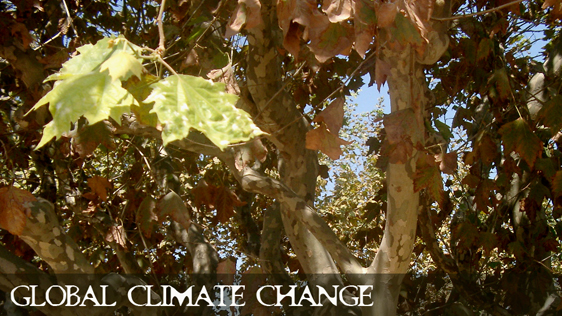
Due to the science we already have, the laws we have to govern our own activity and to force government to act for the public health, we face the real possibility of being forced, in American courts, in the future, to pay for damage done to the most affected populations in other parts of the world, as a result of inaction by our government. And if not in court, then as a matter of the de facto urgencies of international political stability.
If we do not find a way to work to mitigate global climate change, future generations will look back and will see clearly that a zeitgeist of selfish convenience and primitive disregard for the wellbeing of our fellow human beings led to a reckless attitude with regard to this snowballing crisis. The public voice, and those campaigning for the level of public respect needed for election to office, should bring this issue to the fore, push for real initiatives to tackle the problem boldly, in a collaborative way, now.
In November, UN secretary general Ban Ki-moon wrote a piece entitled "At the tipping point", in which he explained some of the most dire aspects of the advancing effects of global climate change. Among the serious potential crises is the evidence that 20% of of Antarctica's territory, in the form of the West Antarctic Ice Sheet, may break up. "If it broke up, sea levels could rise by six meters", he writes.
Added to that, such massive events may take some time to unfold, but once they reach their respective tipping point, the event itself could happen "quickly, almost overnight". It's worth considering what effect such a sudden sea-level rise would have on low-lying coastal cities, like New York, Mumbai or Shanghai, Dubai, Sydney or Hong Kong. The storm surge that breached New Orleans' levees and plunged the city into chaos was roughly six meters.
The IPCC is one of the most comprehensive and prestigious bodies of scientists ever gathered from around the world, and it has been unequivocal in its reports this year. Every major player in world politics, including Pres. Bush, has acknowledged that global climate change is happening, and is the result of human activities. 2007 will be remembered as the year the climate crisis went public and stayed on the global public interest radar, for good. The United States cannot afford to be lagging behind, not now, and not in the eyes of history.
Senator Barack Obama's campaign website explains the problem as follows: "Global warming is real, is happening now and is the result of human activities. The number of Category 4 and 5 hurricanes has almost doubled in the last 30 years. Glaciers are melting faster; the polar ice caps are shrinking; trees are blooming earlier; oceans are becoming more acidic, threatening marine life; people are dying in heat waves; species are migrating, and eventually many will become extinct." In fact, large-scale mass extinction already appears to be underway, with the IPCC predicting 15% to 37% of all species may be wiped out by climate change alone.
The campaign issue write-up continues: "Scientists predict that absent major emission reductions, climate change will worsen famine and drought in some of the poorest places in the world and wreak havoc across the globe. In the U.S., sea-level rise threatens to cause massive economic and ecological damage to our populated coastal areas." Many may disagree, but the science supports every word of the problem as stated. US presidential candidates are, for the first time, seriously contending for the climate-responsibility prize.
So, for those candidates serious enough to work across ideological rifts, a proposal for responsible legislation to deal with this crisis (to be pushed for and initiated in advance of the November 2008 US elections):
1. Push a 90% emissions reduction goal for 2050, and make it global. (There's no reason this cannot be done. Wind-energy resources in Texas, Kansas and North Dakota alone could power the entire US economy and more, if properly funded and developed. Most nations have a surplus of wind resources; the secret is local development and responsible construction and implementation. Other new technologies and a rebuilding of transport infrastructure can help reach this goal, without undermining economic stability.)
2. Work to punish all forms of corruption associated with energy production, and implement stiff sanctions against any nation that does not severely punish such corruption (whether it's bribery is Appalachian coal mining schemes, Saudi authoritarianism and arms trafficking, Uzbekistan's megalomaniac leader, or China's support for the Bashir government in Khartoum).
3. Ensure that the US economy is incentivized, from top to bottom, to adopt renewable resources and that we can fund through innovation, entrepreneurship, research and development grants, the green technology boom, which if properly carried out, will far surpass the 1990s economic expansion related to the building and popularization of the world wide web.
4. Institute in US law a "limited use" doctrine for nuclear plants, which means they will be employed in a period of transition (with no new construction) as a means of softening the price pinch that could come to sectors that lag in the renewables transition. This is not meant to allow new growth or prolonged use of fossil fuels, but rather to avoid punishing the underprivileged for their lack of access to easy capital. Eventually, a plan will need to be implemented that will transition away from these extremely costly plants with unequaled capacity for contamination (in case of accident).
5. Greening the military: begin immediately the funding and incentivization for defense contractors of a comprehensive transition to a military made more efficient, flexible and green in its global reach by way of the ecological (which in the very near future means economic) sustainability of its technologies and deployment systems. This will soon be a measure of rapid-deployment capacity, i.e. the ability to project power without bankrupting the state, so there is a direct security motivation involved in this. (The US military is a massive source of research and development, and cutting-edge technologies could emerge for civilian use, if the fossil fuel addiction is broken.)
6. Plan for "jump" generation innovations: energy resourcing is still in its infancy, comparatively (fossil fuels are square one; nuclear a bold but ill-advised 'spur'; renewables are the first step toward rational sustainable energy policy; after renewables, or within the context of, there will come a more advanced mode of powering the global economy). Geothermal still relies on risky construction methods, wind requires massive construction and solar occupies space (ever less, but still a constraint), whereas new capabilities may be lying in wait beyond the scope of current scientific methods.
Let's think ahead and privilege the "zero emissions" criterion. The more we can do to implement large-scale energy solutions that are in themselves zero-emissions processes, the larger the percentage of current emissions we can do without. It's that simple.
We are on the cusp of an energy revolution, which is synonymous with acting to save the relative homeostasis of the global environment, to which our civilization is accustomed and which it requires for long-term stability. We can phase out fossil fuels, then nuclear, while building a global renewables grid, and (parallel to that) jumping ahead to what's next. Integrated thinking will help us to serve the needs of a global systems ecology imperiled by our current practices.
Lastly, I propose that it is of the utmost urgency to examine security risks involved with climate change. We already have water wars in Africa. There are potential hydrological conflicts brewing in South America and south Asia. Australia faces the possibility of the Sydney region becoming near uninhabitable in a century's time. And Bangladesh, with more than 150 million inhabitants, is caught between India's overpumping of vital rivers and the constant threat of mass death and chaos from monsoon flooding.
We need to look at the potential for crop failure on massive regional scales, resulting economic or political collapse, or the unplanned migration of tens of millions of refugees, and what happens when local militia start responding (reference: Darfur, or Afghanistan, on a much larger scale).
We need to find a collaborative framework wherein:
1. democracy is not in any way curtailed nor are totalitarian measures elevated by the global protocols;
2. global treaties are bold, viable, respected and implemented;
3. the median wealth of the human population globally is increased (to de-incentivize violations).
This is the very least we can do to get started.
Tuesday, November 13, 2007
Liberty & Security Wrestle in Pakistan, as Elsewhere: What Does this Mean for 21st Century Democracy?
In many parts of the world, people are presently facing the question, on a societal scale, of whether or not free and open democracy can coexist with measures taken to protect against extremism. The question is an old one and goes to the root of whether it is possible, as a matter of natural law, to vote away one's rights or to vote against democracy.
To take a serious look at this question, we must first consider that: democracy is not an ideology and it is not a system; it is quite simply the idea that no form of government can be legitimate unless it is (regularly) chosen by a free and sovereign people. That can be implemented in a number of ways and need not be contrary to anyone's culture or faith.
But, a new problem has come into play in recent years, which has existed throughout modern times and essentially has always been part of the mix between populist rhetoric and authoritarian rule, from Hellenic city states to the Roman empire up through the 20th century: that is whether the need to be secure justifies overruling the protections that allow for a population of free individuals to choose its government.
Famously attributed to Ben Franklin, but possibly written by diplomat Richard Jackson is the tenet "Those who would give up Essential Liberty to purchase a little Temporary Safety, deserve neither Liberty nor Safety". Clearly, one cannot secure one's liberty by stamping it out, just as one cannot save a village by burning it.
There are countless cases of dictators committing mass murder under the auspices of a prolonged security operation or state of emergency, so it should not be shocking that authoritarian rulers expect to persuade that mass detention, the suspension of civil liberties and attacks on opposition activists can be justified by security concerns, so long as no one is killed.
In Pakistan, we have seen a tragic loss of life —the authorship of which is still undetermined— when a bomb attack targeted Benazir Bhutto's celebratory convoy upon her return after years in exile. Now, we are seeing a general who has ruled as a quasi civilian leader for nearly a decade, targeting all the levers of a democratic state, and making the claim that security and extremism are his concerns.
Maybe. What if? But there is no way to trust in that justification, because as Ms. Bhutto quite rightly points out, extremists are being ignored by the 4,000 police surrounding her home, and the legal system has been dismantled by military decree, added to which we have the constnt problem of a general claiming he plans to save democracy by stamping it out.
There are clearly real security issues in Pakistan. As there were in 1864 when the United States was at war with itself, but still held national elections. As there are at all times in the Philippines, whose government confronts several rebel factions, or even in Spain, where Basque separatists continue to harass the democratic state.
In 2004, when the Spanish ruling party talked of suspending elections because there had been a terror attack, it was top ranking military and police who said they would not stand by and watch the constitution ignored by the government. When the US Dept. of Homeland Security, under Tom Ridge, contemplated suspending November elections, it was the president's own party that responded to public outrage and moved to bar such a move.
Security and liberty are not at odds. They are parallel streams whose tributaries often intersect, but they have their own course and should not be mixed for the political gain of any faction or ideology. This much we should be able to agree on. From there, we need to take a very serious look at what motivates a people to sign away its rights in the confusion of a dangerous moment.
To take a serious look at this question, we must first consider that: democracy is not an ideology and it is not a system; it is quite simply the idea that no form of government can be legitimate unless it is (regularly) chosen by a free and sovereign people. That can be implemented in a number of ways and need not be contrary to anyone's culture or faith.
But, a new problem has come into play in recent years, which has existed throughout modern times and essentially has always been part of the mix between populist rhetoric and authoritarian rule, from Hellenic city states to the Roman empire up through the 20th century: that is whether the need to be secure justifies overruling the protections that allow for a population of free individuals to choose its government.
Famously attributed to Ben Franklin, but possibly written by diplomat Richard Jackson is the tenet "Those who would give up Essential Liberty to purchase a little Temporary Safety, deserve neither Liberty nor Safety". Clearly, one cannot secure one's liberty by stamping it out, just as one cannot save a village by burning it.
There are countless cases of dictators committing mass murder under the auspices of a prolonged security operation or state of emergency, so it should not be shocking that authoritarian rulers expect to persuade that mass detention, the suspension of civil liberties and attacks on opposition activists can be justified by security concerns, so long as no one is killed.
In Pakistan, we have seen a tragic loss of life —the authorship of which is still undetermined— when a bomb attack targeted Benazir Bhutto's celebratory convoy upon her return after years in exile. Now, we are seeing a general who has ruled as a quasi civilian leader for nearly a decade, targeting all the levers of a democratic state, and making the claim that security and extremism are his concerns.
Maybe. What if? But there is no way to trust in that justification, because as Ms. Bhutto quite rightly points out, extremists are being ignored by the 4,000 police surrounding her home, and the legal system has been dismantled by military decree, added to which we have the constnt problem of a general claiming he plans to save democracy by stamping it out.
There are clearly real security issues in Pakistan. As there were in 1864 when the United States was at war with itself, but still held national elections. As there are at all times in the Philippines, whose government confronts several rebel factions, or even in Spain, where Basque separatists continue to harass the democratic state.
In 2004, when the Spanish ruling party talked of suspending elections because there had been a terror attack, it was top ranking military and police who said they would not stand by and watch the constitution ignored by the government. When the US Dept. of Homeland Security, under Tom Ridge, contemplated suspending November elections, it was the president's own party that responded to public outrage and moved to bar such a move.
Security and liberty are not at odds. They are parallel streams whose tributaries often intersect, but they have their own course and should not be mixed for the political gain of any faction or ideology. This much we should be able to agree on. From there, we need to take a very serious look at what motivates a people to sign away its rights in the confusion of a dangerous moment.
Sunday, October 14, 2007
Nobel Peace Prize Awarded for Work to Raise Awareness About Global Climate Change

Sentido.tv :: Climate change is no longer controversial; it has been accepted as scientific fact by a global consensus of researchers and policy makers, including the Bush White House, which resisted acknowledging human activities were a vital contributing factor, until recently. Now the Nobel committee selecting the Peace Prize laureate has raised the issue of warming posing a major international security crisis.
At a September conference he hosted on 'Energy Security and Climate Change', Pres. Bush acknowledged the validity of the IPCC's research, stating "A report issued earlier this year by the U.N. Intergovernmental Panel on Climate Change concluded both that global temperatures are rising and that this is caused largely by human activities. When we burn fossil fuels we release greenhouse gases into the atmosphere, and the concentration of greenhouse gases has increased substantially."
And now, the political class in the US liberal-conservative hot-bed must grapple with the fact that climate change will be, when its most serious repercussions are felt, an international security issue, pushing millions of refugees across borders in search of basic sustenance, like water and food. And policy-makers in the US must come to terms with their very real role in shaping the global capacity to confront these adverse consequences.
The Sudan is cited as a first-case. It's long civil war, in which the Khartoum-based regime fought against rebellions in the east, south and west of the country, had a lot to do with food and water scarcity, and the need to control natural resources like oil in order to have the wealth to import sufficient amounts of those vital commodities or to build needed irrigation. Khartoum would not allow local control in any part of the country. Further desertification, the "advance of the Sahara", threatens to return Sudan to multi-party civil war.
More global cases involve countries like China, India and Pakistan, three nuclear powers, which could find themselves engaged in a brutal life and death struggle to provide water to their immense populations, as snow-melt from the Himalayan Plateau becomes scarce. The world cannot afford to allow such a war, or its causes, to burst forth.
The IPCC, which shares the award with Mr. Gore, the world's most visible climate campaigner, has issued several reports this year alone putting top-line consensus climate science into the public domain and forcing governments to keep dealing with the issue publicly and diplomatically. [Complete Text]
Monday, October 8, 2007
Project Quipu: Integrated Economic Atlas for the 21st Century
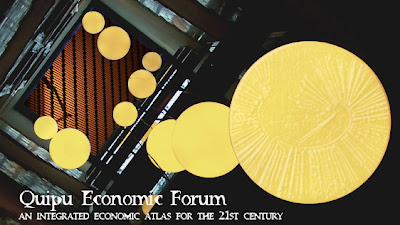
. . . INTRODUCTION
Examining the manner in which financial news is reported in the popular media, THINK proposes to create a system whereby live-update, rss-technology, and financial and editorial expertise, come together to produce a reliable up-to-the-minute resource for evaluating broad economic trends and engagements, without limiting analysis to single-parameter references like GDP or individual stock indices.
It is often thought that in order to organize ideas or to put some kind of order to any analysis, one needs uniformity, a limited number of generic categories and a single system of uncomplicated parameters by which to categorize each subject under review. But the truth is, this uniformity is not and will not be the rule of any part of lived reality.
To emerge from the fog of flawed, incomplete and opportunistically limited economic and financial analysis, means we need to come to grips with the fact that all resources, all functions or 'services', be they natural or the product of human ingenuity, figure somehow in economic values at all levels. There may be no clear way to quantify their contribution or mercantilize them, but they are there, and nothing can be fully understood in economic terms without seeing this. [Complete Text]
Thursday, October 4, 2007
Darfur Scene of Ongoing Ethnic Cleansing, Largest UN Peacekeeping Force Deployed
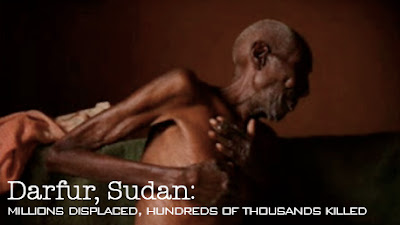
Sentido.tv :: Darfur, beset by years of bloody internecine violence, with the Khartoum-backed janjaweed militia killing civilians in numbers the US government has officially declared to be genocide, is still struggling to find a real beginning for peace. For years, human rights groups have pleaded with the international community to intervene, with or without the support of the Khartoum government. Finally, in August, the UN Security Council ordered the world's largest peacekeeping mission to secure Darfur.
Estimates at the time suggested that at least 200,000 people have been killed in Darfur, with more than 2 million refugees unable to return home, some since 2003. UN secretary general Ban Ki-moon has noted the scale of the mission is "unprecedented" and told the Security Council "You are sending a clear and powerful signal of your commitment to improve the lives of the people of the region, and close this tragic chapter in Sudan's history".
After years of staunch opposition and threats, the government in Khartoum said it would "support" a UN force to police Darfur, but only after intense negotiations, the backing of China, a key Sudan ally, and the "toning down" of language attacking Khartoum for involvement in a deliberate campaign of genocide. China's backing allowed for a unanimous vote in favor of the peacekeeping mission.
But cooperating has been spotty, and human rights groups are now calling for a comprehensive probe of the murder of 10 peacekeepers and police, allegedly by the same groups accused of carrying out the slaughter of Darfur civilians. It remains unclear whether the Khartoum government is committed to peace, and the rebel groups have not all signed up to the framework for peace.
The world community is facing in the case of Darfur a grave challenge to the rule of law and the right of people to live free of state-backed killing. Issues of national sovereignty, state policing powers, interventionist diplomacy and regional unity have made resolving the fractious crisis a political hot-button among security council powers, so for now, much depends on the success of the peacekeeping mission in overseeing tenuous peace.
MORE AT
Sentido.tv, Darfur Humanitarian Crisis Special Report
Sunday, September 30, 2007
The Elders Initiative, an Effort to Infuse Wisdom into Global Policy & Conflict Resolution
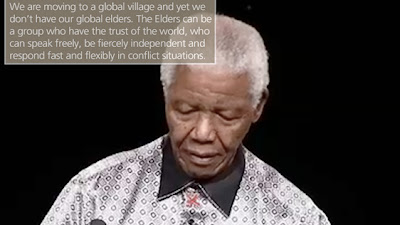
The Elders is a humanitarian initiative led by South African archibishop Desmond Tutu and former South African pres. Nelson Mandela, designed to bring the African "village elders" concept to the global village, in an effort to defuse flashpoint crisis situations and speed responsible policy-making. Its foundations are the basic principles of human rights and the experience and credibility of the group's emissaries.
Apart from Mandela and Tutu, the group also includes Mandela's wife Graça Machel, Kofi Annan, Lakhtar Brahimi, fmr. US pres. Jimmy Carter, Ela Bhatt, Gro Brundtland, Fernando Cardoso, Li Zhaoxing, Mary Robinson and Muhammad Yunus, founder of the Nobel laureate Grameen Bank for microcredit.
The stature of those included is part of what is expected to bring an international diplomatic prestige to its chosen approach to select humanitarian causes and conflict resolution. The Elders have said they reserve a place for detained Burmese opposition leader Aung San Suu Kyi. The idea was originally brought to Mandela seven years ago by British billionaire and philanthropist Richard Branson.
Nelson Mandela, in his inaugural address to announce the group's founding, said:
"As institutions of government grapple, often unequally, with challenges they face, the efforts of a small, dedicated group of leaders, working objectively and without any vested interest in the outcome, can help resolve what often seem like intractable problems ... Using their collective experience, their moral courage and their ability to rise above the parochial concerns of nation, race and creed, they can help to make our planet a more peaceful, healthy and equitable place to live."
He added that the group will not become "arbitrary and arrogant" and will seek "long-term, sustainable approaches", based on the advice of local interests, scientific experts, political advisors and "anyone who is motivated to help resolve a problem".
The group's first mission will be to Sudan, in an effort to lay the groundwork for a lasting political solution to end the killing in Darfur and help Darfurians return to their homes, re-establish civil society, obtain an appropriate level of self-rule and get the food and medical aid needed to help achieve these goals.
The peace negotiated in Darfur is tenuous at best, as one of the major rebel factions has refused to sign on so long as the Khartoum government remains in political and military control of the region.
Mandela also declared that "It is kindness and generous accomodation that are the catalysts for real change", citing the African proverbial idea that "we are human only through the humanity of other human beings" and foresaw the group bringing "new energy to areas where others have become weary, because of endless conflict."
Wednesday, September 26, 2007
Clinton Global Initiative Brings Together 1,300, Including 52 Current or Former Heads of State
Former US pres. Bill Clinton's Global Initiative (CGI) holds a major international stakeholders' and donors' conference each year in conjunction with the UN's General Assembly, in New York City. This year's convention brings together 1,300 delegates from 72 countries. 52 active or former heads of state are participating, in only the 3rd year of this no-nonsense charity initiative.
'Members' contribute $15,000 in order to participate and must 'commit' to contributing or carrying out work of some concrete kind. They must come to the event with a plan already laid out and a clear agenda for enacting the plan. Political leaders, NGOs, business people, from around the world attend, with the aim of finding creative solutions to the world's most serious or deep-rooted problems. They must produce financial backing to bring their planned project to life before the following year's convention.
In order to ensure that the process is not just talk or debate, CGI requires as a condition of membership that those who do not follow through on their commitments be barred from attending the following year. Between the first and second conventions, 17 participants were not allowed back. Between the second and third (this year's), only five failed to return. The idea is to ensure that the event is not misused as a way to 'network' with powerful people, that its initiatives be a form of concrete progress and an example to other charitable endeavors.
The first two years of CGI raised over $10 billion for causes around the world, funding more than 600 'commitments' worldwide. The concept behind the initiative is to ensure that people with the conceptual and technical expertise have direct contact with the most influential backers to enact the kind of change needed specifically in certain areas.
As is prominently announced on the CGI website in a quote from Mr. Clinton, the idea is "to turn good intentions into real action and results". By building the requirement to follow through into the process of attending, proposal and planning, CGI has become an innovative example of effective global leadership, where interests come together and shared benefits can be both illustrated and made reality.
MORE AT
AP: "Clinton Global Initiative Hears Pledges" [2007 convention]
Washington Post: "Clinton Gathers World Leaders: Nonpartisan Conference Focuses on Global Improvement" [on 1st convention, in Sept. 2005]
Population, Land & Conflict
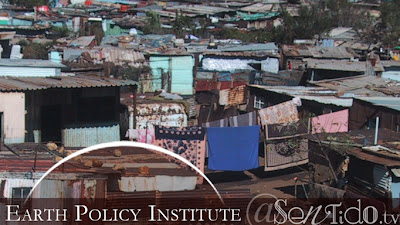
Lester R. Brown, EPI :: As land and water become scarce and as competition for these vital resources intensifies, we can expect mounting social tensions within societies, particularly between those who are poor and dispossessed and those who are wealthy, as well as among ethnic and religious groups. Population growth brings with it a steady shrinkage of life-supporting resources per person. That decline, which is threatening to drop the living standards of more and more people below survival level, could lead to unmanageable social tensions that will translate into broad-based conflicts.
Worldwide, the area in grain expanded from 590 million hectares (1,457 million acres) in 1950 to its historical peak of 730 million hectares in 1981. By 2004, it had fallen to 670 million hectares. Even as the world’s population continues to grow, the area available for producing grain is shrinking.
Expanding world population cut the grainland area per person in half, from 0.23 hectares (0.57 acres) in 1950 to 0.11 hectares in 2000. (See data at http://www.earth-policy.org/Books/Out/ch2data_index.htm) This area of just over one tenth of a hectare per person is half the size of a building lot in an affluent U.S. suburb. This halving of grainland area per person makes it more difficult for the world’s farmers to feed the 70 million or more people added each year. If current population projections materialize and if the overall grainland area remains constant, the area per person will shrink to 0.07 hectares in 2050, less than two thirds that in 2000.
Having less cropland per person not only threatens livelihoods; in largely subsistence societies with nutrient-depleted soils, it threatens survival itself. Tensions among people begin to build as land holdings shrink below that needed for survival. The Sahelian zone of Africa, the broad swatch of the continent between the Sahara Desert and the more lush forested land to the south, which stretches from Sudan in the east through Mauritania in the west, has one of the world’s fastest-growing populations. It is also an area of spreading conflicts.
In troubled Sudan, 2 million people have died and over 4 million have been displaced in the long-standing conflict of more than 20 years between the Muslim north and the Christian south. The conflict in the Darfur region in western Sudan that began in 2003 illustrates the mounting tensions between two Muslim groups—Arab camel herders and black African subsistence farmers. Government troops are backing Arab militias, who are engaging in the wholesale slaughter of black Africans in an effort to drive them off their land, sending them into refugee camps. To date, some 140,000 people have been killed in the conflict and another 250,000 have died in the refugee camps of hunger and disease.
In Nigeria, where 130 million people are crammed into an area not much larger than Texas, overgrazing and overplowing are converting 351,000 hectares (1,350 square miles) of grassland and cropland into desert each year. The conflict between farmers and herders in Nigeria is a war for survival. As the New York Times reported in June 2004, “in recent years, as the desert has spread, trees have been felled and the populations of both herders and farmers have soared, the competition for land has only intensified.” [Complete Text]
Sunday, September 23, 2007
Geothermal Energy Creates Hope for Global Energy Solution

Sentido.tv :: Steam-driven process using deep underground vents to super-heat water could be 'nearly inexhaustible' resource...
The race to tap large quantities of underground, geothermal energy is heating up. In a recent bid to solve their country's demand for clean energy, the Swiss are digging deep, and the Earth is responding. A scientist at MIT, in the US, says 40% of US geothermal sources could power the entire country's energy needs in excess of 56,000 times.
At a cost of $51 million so far, the Swiss experiment in delving under the earth's crust has proven successful. The plan is to circulate water deep into the ground using shafts a bit larger than those used in drilling for oil, except pumping water and gaining access to high levels of heat, enough to harness the capacity to run a steam turbine and power an estimated 10,000 homes and offices.
The type of geothermal hot rock technology is called 'enhanced geothermal systems,' and drills into very hot granite at 400 degrees F. Even though the holes dug for these systems are deep, it only scratches the earth's surface and remains well away from the inner regions. 99% of the earth's interior is even hotter, at about 1000 degrees, where the technology is not designed to go, and where human science cannot yet reach without justfiable concerns about undesirable magma or gas leaks.
The science seems straighforward enough, but there may be a catch. In early December, the country registered a magnitude 3.4 tremor in response to Geothermal Basel's project to gain access to this untapped energy source. Coursing water through bored holes in the earth several miles deep has destabilized subsurface layers of crust causing shifts. The resulting tremors throughout the Basel region alarmed authorities enough to temporarily halt activity.
Clean and in ample supply, geothermal energy has the potential to power the current global population and much more without degrading the environment. The drawbacks include cost of drilling and stiff price competition from current fossil fuel extraction. Scientists say that certain hot rock source supplies, that cost about $7 to $8 million to drill, provide energy for only a limited amount of time, requiring a new source to be found after maybe just a decade. [Complete Text]
Saturday, September 22, 2007
World Creating Food Bubble Economy Based on Unsustainable Use of Water
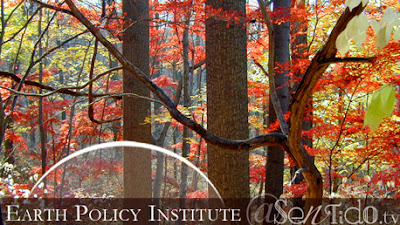
Lester R. Brown, EPI :: On March 16, 2003, some 10,000 participants [met] in Japan for the third World Water Forum to discuss the world water prospect. Although they [would] be officially focusing on water scarcity, they [would also] indirectly be focusing on food scarcity because 70 percent of the water we divert from rivers or pump from underground is used for irrigation.
As world water demand has tripled over the last half-century, it has exceeded the sustainable yield of aquifers in scores of countries, leading to falling water tables. In effect, governments are satisfying the growing demand for food by overpumping groundwater, a measure that virtually assures a drop in food production when the aquifer is depleted. Knowingly or not, governments are creating a "food bubble" economy.
As water use climbs, the world is incurring a vast water deficit, one that is largely invisible, historically recent, and growing fast. Because the impending water crunch typically takes the form of falling water tables, it is not visible. Falling water tables are often discovered only when wells go dry.
Once the growing demand for water rises above the sustainable yield of an aquifer, the gap between the two widens each year. The first year after the line is crossed, the water table falls very little, with the drop often being scarcely perceptible. Each year thereafter, however, the annual drop is larger than the year before.
[...] Aquifers are being depleted in scores of countries, including China, India, and the United States, which collectively account for half of the world grain harvest. Under the North China Plain, which produces more than half of China's wheat and a third of its corn, the annual drop in the water table has increased from an average of 1.5 meters a decade ago to up to 3 meters today. Overpumping has largely depleted the shallow aquifer, so the amount of water that can be pumped from it each year is restricted to the annual recharge from precipitation. This is forcing well drillers to go down to the region's deep aquifer, which, unfortunately, is not replenishable.
He Quincheng, head of the Geological Environmental Monitoring Institute in Beijing, notes that as the deep aquifer under the North China Plain is depleted, the region is losing its last water reserve—its only safety cushion. His concerns are mirrored in a World Bank report: "Anecdotal evidence suggest that deep wells [drilled] around Beijing now have to reach 1,000 meters [more than half a mile] to tap fresh water, adding dramatically to the cost of supply." In unusually strong language for the Bank, the report forecasts "catastrophic consequences for future generations" unless water use and supply can quickly be brought back into balance. [Complete Text]
MORE AT
Sentido.tv, Water Crisis Special Report
Sentido.tv, Sustainable Development Report
EPI, la Eco-Economía, en español
Mozambique's 'Tree of Life' Project Turns Used Weapons into Signs of Hope
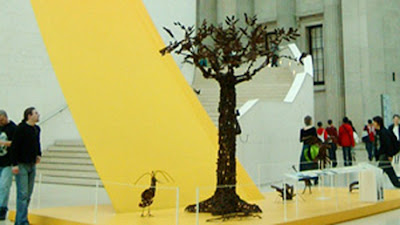
Sentido.tv :: In the wake of Mozambique's long civil war, lasting from 1976 to 1992, a group of artists, sponsored by Christian aid, set up the Transforming Arms into Tools (TAE) project in the nation's capital, Maputo. Sculptors use decomissioned weapons, and parts of weapons to make art, expressing the possibility of finding new ways to secure and advance civil society.
The TAE project encourages people to exchange weapons for useful tools, such as sewing machines, tools for farming and other items that can help sustain a productive, if modest lifestyle. The project is thoroughly humanitarian and aims to educate people, to remind them of the horrors of war, and to show that good will is more powerful than the technology of war.
The "Tree of Life" is one of the most inspired and spectacular results of the project. It was sculpted by Cristovao Canhavato (Kester), Hilario Nhatugueja, Fiel dos Santos and Adelino Serafim Maté, four artists from Mozambique. At 3.5 meters in height, the Tree of Life was installed at the British Museum in London, as part of its year-long feature Africa 2005.
The sculpture and some smaller pieces, which include fascinating renditions of regional African fauna, are touring different sites where they can deliver the message that in Mozambique culture has turned toward an enduring commitment to end armed conflict and build a society structured around creative expression and learning.
Mozambique's long and arduous civil war, which began in 1976, in the wake of the collapse of Portugal's dictatorship and the withdrawal of troops from resistant former colonies, lasted for over 16 years. An estimated 1 million people were killed, upwards of 1.7 million fled into neighboring countries, and several million more were internally displaced.
Graça Machel, wife of former South African president and Nobel laureate Nelson Mandela, is quoted as saying: "When you see this Tree, you don’t just see Mozambique, you see the face of Africa. You see in the sculpture all the conflicts which have gone on in the making of it, and that’s why it’s wonderful to see the great space the British Museum has given it..." [Complete Text]
Amnesty Reported in 2006: International Arms Trade 'Out of Control'
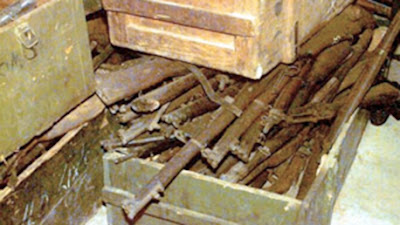
Sentido.tv :: Human rights group says 'opaque chain' of private interests increasing shipments of dangerous arms, with little supervision...
Amnesty International (Amnesty/AI) has published a new report examining the international arms trade, and its findings indicate there is little control on the expanding web of private interests seeking to profit from a proliferation of dangerous weapons. The report also illustrates the ways in which this scattering of dangerous weapons has led to severe human rights abuses.
AI arms expert Brian Wood told the Reuters news service "Brokering is increasingly common, with main contractors sub-contracting supply, transportation and collection in an ever lengthening and increasingly opaque chain". The supply chain is slipping beyond the grip of international arms control law and regulatory agencies.
His concern, as expressed in the report "Dead on Time: arms, transportation, brokering and the threat to human rights", is that this type of shady arms trafficking is stirring conflict and facilitating gross abuses of human rights, even as perpetrators are enabled to hide their caches from international bodies.
The Amnesty report makes several suggestions for curbing the near rampant spread of small arms and military equipment to developing countries and conflict zones. Among these suggestions is a more uniform regime of arms control laws, beginning at the national level and meeting international standards based on a global treaty framework.
It calls for "Making violations of UN arms embargoes a criminal offence in all states and in the case of serious violations, a crime with universal jurisdiction". Such a provision would mean that individuals serving in governments or linked to arms manufacturers could face charges in any country for violating any arms embargo anywhere.
The principle is that without this sort of barrier to the spread of weapons, the motive to profit by circumventing international arms embargoes against corrupt or tyrannical regimes or against sending weapons into conflict zones would too easily (as it does not) find a way to serve its interests, endangering possibly millions of lives.
[...] There is no clear message from any one government on its involvement in any of these transactions or whether they are seen to contravene existing human rights treaties or war profiteering provisions of domestic laws. But the aim of the report seems to be to raise awareness among officials of leading arms exporters.
The report ultimately calls for 13 specific steps to enhance international security measures throughout the arms trade, which it hopes will be more likely after a publication campaign to raise the public's interest in pushing officials to limit such exports where conflict or tyranny is enabled or perpetuated by this sort of trade. [Complete Text]
Wednesday, September 19, 2007
Water Resource Stress: Global Economic-Ecological Factor for the 21st Century
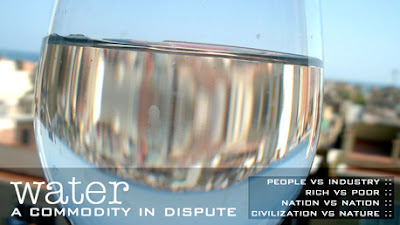
Sentido.tv :: More than 1 billion people already face fresh water scarcity, figure expected to double in 20 years' time
Water is one of the "fundamental building-blocks of life", as is often said in science, in biology classrooms, in medicine, theology, environmental policy debates, and in cosmology and space exploration. It is also a commodity whose economic reality is increasingly defined by chronic scarcity and often intensely uneven distribution.
One of the most vital problems regarding the global water supply is the fact that we are already over-exploiting it, draining vital fluvial systems and ancient underground aquifers that cannot be replenished. This, coupled with the population boom and increasing industrialization, urbanization and consumerization of emerging economies, means global scarcity is fast becoming the rule.
In highly populated regions with little or highly-variable rainfall, irrigation and industrial uses are putting unsustainable pressures on the supply of safe drinking water. At least 1 billion people worldwide currently suffer the perils and hardships of a lack of clean drinkable water.
Experts calculate that by the year 2025, some 1.8 billion people will be living in regions with "absolute scarcity" of water resources, meaning they will be unable to meet demand for drinking water, irrigation or industry. The result is likely to be widespread economic chaos, famine, migration, and conflict, if no remedies are put in place ahead of time.
The first and most obvious result of such shortages is mass migration, the other is the spread of water-borne bacteria and infectious diseases. The human body can only survive a few days without hydration, so "absolute scarcity" has 3 key effects:
MASS MIGRATION: those who suffer the most extreme scarcity must move in search of survival;
DISEASE: water that carries toxins, disease and even raw sewage is a last resort, but becomes a tempting resource, and so disease takes root and spreads among afflicted and displaced populations;
COLLAPSE OF THE FOOD SUPPLY: extreme drought and desertification often follow a period of intense or prolonged degradation of agricultural water resources...
In such situations, the problem is massive and severe enough to generate real political instability and be a security concern for national governments. This means law, treaty and military power come into play, and economic crisis can rapidly evolve, or degenerate, into armed conflict. [Complete Text]
MORE AT
Sentido.tv, Water Crisis Special Report
Sentido.tv, Sustainable Development Report
EPI, la Eco-Economía, en español
Labels:
environment,
security,
sustainable development,
water scarcity
Dirty Air Tied to Economic Growth

The world is facing a major environmental crisis, with multiple serious battles to fight on various fronts, if we are to avert crippling long-term environmental degradation. One fundamental problem is that post-industrial societies have not sufficiently divorced their economic activity from extreme contaminants like carbon-based fuels, so that special cases of exorbitant economic growth continue to bring with them high levels of particulate air pollution.
Barcelona, with a liberal government and policies designed to make its bus system less emissions intensive, congestion taxing on cars and a vast public transport network, has been listed not as one of the most polluted cities in the world, but as having on average across the metropolitan area the 8th worst concentration of particulate matter small enough to be ingested by respiration, out of a limited survey of 26 cities worldwide. Part of the reason is that the city has, despite its reputation as a progressive political stronghold, never implemented the EU's caps on particulate-matter pollution.
The regional government now says it seeks to meet those goals with a series of new initiatives, and that by 2010, the city will be able to prevent more than 1,000 deaths per year attributable to ailments derived from breathing high levels of pollutants. But part of the global problem tied to pollution is that cities, regions and nations that see intense economic expansion (Barcelona's tourism and real estate markets have expanded massively each year of this decade) tend to see an intensification of air pollution.
Two years ago, China was listed as host to the 8 most polluted cities in the world, and 10 of the 15 most polluted. While it is not clear that Beijing has effectively reduced nationwide pollution, and we have numerous stories each year of chemical spills, contaminated waters flooding cropland, cover-ups of environmental degradation and the massive desertification of the country's northwest, it is true that playing host to the Olympic Games in 2008 has meant that strict measures are being taken to reduce the capital's epic levels of smog.
We must ask ourselves: what policies can be implemented, rapidly and on national scales, to bring into practice environmentally sustainable industrial methods of production? And, what is needed to ensure that assistance and incentives are provided to cities and regions whose economic growth might not coincide with a political drive to clean up the air or regulate emissions?
MORE AT:
Sentido.tv: "Barcelona Places 8th Worst for Air Quality in Study of 26 Cities"
La Vanguardia: "Barcelona, octava ciudad más contaminada por encima de México, Berlín, Tokio, Londres o Nueva York" [Actualizado después]
CREAL: "Reduir la pol·lució atmosfèrica a l’àrea metropolitana de Barcelona aporta grans beneficis per a la salut (convocatòria de premsa)"
Thursday, September 13, 2007
Introducing the Crisis Policy Forum, a Casavaria discursive community project
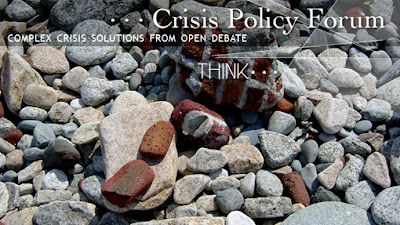
The Crisis Policy Forum is an online community project with a view to fomenting open debate and discourse on humanitarian, political and economic crises across the world. CPF aims to highlight and bring about new research and policy-proposals, to produce viable, locally-relevant solutions to pervasive crises such as fresh-water scarcity, chronic poverty, access to technology and education, voting rights, agricultural sustainability, infectious disease, conflict resolution and democracy.
The mission of CPF is not profit-driven or entrepreneurial, but is, rather, intended to focus on directing major policy initiatives toward sound, evidence-based efforts that strengthen the fabric of local communities and civil society. An essential ingredient in this project is the recognition that: ideology is a mystical devotion to singular, exclusive political structures, which as a result tends to bring about division, arbitrary exercise of power, social 'blockage', stagnation in the marketplace of ideas, persecution and a 'dumbing down' of the process of inquiry, generally.
Ideals are necessary in the planning, living and evolution of any human endeavor, but cannot be applied as blanket solutions; they are not solutions but rather seeds for thought and must be channeled through local context and available resources, needs, choice and applicability to the problem at hand; when the ideal is not imposed but is chosen voluntarily by those affected, it ceases to force or attack and begins to help resolve problems, which are, essentially, the lack of 'ideal' conditions.
CPF will combine statistics, reports from UN agencies, governments, non-governmental organizations, academics, essays on theory, history and actual policies introduced, examining how they proceed, what level of success is perceived to have been achieved, by various 'stakeholders' (involved parties, both those affected and those acting to implement policy initiatives). The format will be open, and initially without hard channeling of information, as we seek to build a reserve of commentary and a well-spring of concepts, critiques and innovative thought.
THINK: a new research project evolving solutions for smarter living

Through the 'Think' project, Casavaria aims to develop major new technologies to help bring the costly aspects of everyday post-industrial life in line with what the planet, and civilization itself, can sustain. The project seeks to reduce instability in technology for communication and to develop an entirely new sort of renewable "fuel" source.
Both of these inaugural projects are at present in the theoretical phase. To continue research and development, Casavaria will be seeking to collaborate with experts in diverse fields of study and engineering, and to find funding for projects whose results should resonate at the heart of everyday experience in today's world.
Think is envisioned as a forum which may bring together scientists, authors, researchers, critics, hobbyists and lay people, in an effort to spur discussion and to foment innovation. Projects proposed by Casavaria will remain the intellectual property of the Think project, though collaborators may from time to time be officially recognized by the editors, due to their contributions in this forum.
With Think, Casavaria takes the view that research must be open and avoid bias toward even its own stated goal, but research will be conducted, promoted or discussed, with the policy that the problem is not whether a good idea is possible, but how to achieve it, or which of various possible scenarios is optimal for all involved. [Full Text]
Subscribe to:
Posts (Atom)











